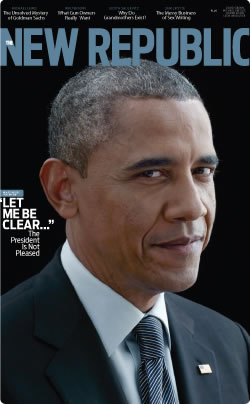
Brad De Long over at his website (image from Wikimedia commons):
Kephalos: I suppose that if you want to say that the *Old New Republic *was a national treasure because it provided a place where Spencer Ackerman could publish, gain an audience for, and afford to write 10000-word highly-passionate highly-informed and -informative world-class rants about the moral and practical collapse of American foreign policy, than argue away; and that Franklin Foer is an excellent editor because he cherishes cranky, talented, passionate people and provides them with space where they can write long-form pieces telling their readers what they should think–well, then, argue away. But I don't think you are going to get very far.
Glaukon: The problem was that the Old New Republic was not especially good in “telling its potential readers how to think”.
Artaphernes: Not to mention that when it did tell readers what to think, the subtext was always that one should be willing to go the extra mile to indulge and to suck up to the various and manifold bigotries of Martin Peretz and company…
Glaukon: In fact, Corey Robin quotes Alfred Kazin to the effect that the front-of-the-book of the Peretz New Republic*–even in its best Hertzberg and second-best Kinsley incarnations–was rather bad at telling readers what to think:
As things go now, I cannot imagine ever appearing outside the literary section…. What I read in the front of the book is informative, saucy, in tone terribly sure of itself. It gives me no general enlightenment on the moral and intellectual crisis underlying the crisis of the week, above all no inspiration. There is no discernible social ideal behind all the clever counter-punching. Washington is more beautiful and imposing than it has ever been, is a wonderful town to look at—-if you overlook Anacostia and Shaw…. The many clever people in and out of government are not “intellectuals” in the old sense–thinkers with a sense of prophecy–but “experts,” no-nonsense minds that can chill me….
I wish I conld think of TNR as moving beyond post-leftist crowing—-beyond a certain parvenu smugness, an excessive familiarity with the inside track and the inside dope, and, above all, beyond that devouring interest in other journalists that confines so many commentaries out of Washington to triviality. I wish I could think of TNR as moving beyond the bristling, snappv, reactive common-sense of the disenchanted liberal. There are worlds within worlds, even in Washington, that are [not] apparent… to the wearilv clever, easily exasperated, heirs and guardians of the liberal democracy that is the one tradition we seem to have left.
Thrasymakhos: And at its worst? The Kinsley Old New Republic was mostly snark, #slatepitch avant-le-lettre, and a strong desire to find some clever contrarian reason to agree with Reagan. And the Hertzberg Old New Republic–listen to Hertzberg talk about the 1986 “The Case for the Contras”:
Things could get heated, as they did—to take a paradigmatic example—when we debated what to say about how the United States should treat Nicaragua’s Sandinista regime. The subsequent lede, titled “The Case for the Contras,” was published in the issue of March 24, 1986. It was an unqualified endorsement of the Reagan administration’s policy of trying to overthrow the Sandinistas by any means necessary, starting with military aid to the Contra guerrillas. The motives it attributed to critics of the Reagan policy were limited to isolationism, defeatism, willful blindness, and selective “scrupulousness” about the sovereignty of “states ruled by pro-Soviet Leninists.”…
The author of “The Case for the Contras” was Charles Krauthammer, the future Irving Kristol Award–winning, Bradley Prize–winning, William F. Buckley Award–winning (and, to be fair, Pulitzer Prize–winning) hero of conservative intellectuals and Fox News dittoheads alike. None of that could have been predicted when Charles joined The New Republic….
More here.
